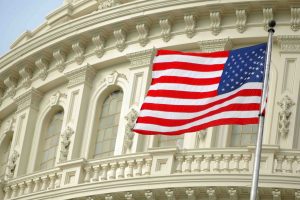Although Congress is in August recess, there’s still much to report. We stepped away in July to focus entirely on the 2025 Digital Media and Developing Minds International Scientific Congress in Washington, D.C., leaving lots to catch up on in this issue. A special issue dedicated to highlights from the Congress will be coming soon, so stay tuned!
AI Regulation: Moratorium Removed, Executive Orders Issued
In June, the draft federal budget included a state AI regulation moratorium. The provision faced broad opposition—from bipartisan advocacy groups to AI companies—and was ultimately removed via an amendment from Senator Marsha Blackburn (R-TN). The moratorium aligned with the Trump–Vance administration’s broader push to accelerate AI development in the United States. President Trump has issued multiple executive orders on AI, including three in July aimed at boosting AI exports, expediting data center growth, and promoting “ideological neutrality” in AI systems.
New AI Accountability Legislation
Just before recess, Senators Richard Blumenthal (D-CT) and Josh Hawley (R-MO) introduced the AI Accountability and Personal Data Protection Act. The bill would allow individuals to sue anyone who uses their data to train a generative AI system without their explicit consent.
Child Online Safety: Mixed Progress in Congress
Last year, child online safety was a major congressional focus. This year, AI policy and a contentious federal budget have often taken precedence—but key bills remain active. The Kids Online Safety Act (KOSA) and Children and Teens’ Online Privacy Protection Act (COPPA 2.0) have both been reintroduced. COPPA 2.0 has advanced through the Senate Commerce Committee, but KOSA has stalled. Senator Blackburn’s successful effort to stop the AI moratorium may have strained relations with Senate Republican leadership, slowing her signature bill. Meanwhile, the House Energy and Commerce Committee is actively exploring paths forward for KOSA and other online safety measures. When Congress reconvenes in September, these bills will be competing for floor time amid what could be a bruising funding battle to avert a government shutdown on September 30.
State Action: School Smartphone Restrictions Expanding
While federal lawmakers debate fiscal issues, states have moved quickly on digital regulation—particularly school smartphone policies. At least 33 states and the District of Columbia require, or will require, some form of restriction in schools. These policies are often intentionally broad, leaving implementation details to districts and schools, and typically include exceptions for accessibility and educational use. Early reports suggest promising outcomes, but further study will be needed.
Supreme Court Upholds Age Verification for Pornographic Sites
In a significant decision, the Supreme Court upheld a Texas law requiring age verification for sites hosting pornographic content, reversing decades of precedent that considered such requirements an undue burden to accessing legal content. The majority opinion argued that technological advancements have made age verification a reasonable safeguard that no longer unduly restricts lawful adult access.

